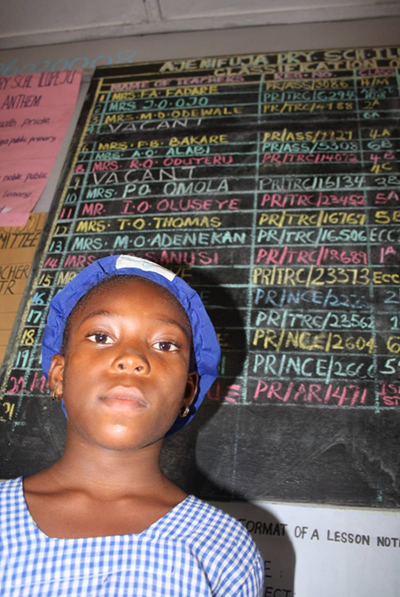Provision of water to Lagos school
‘I will not go outside to fetch water again’ says nine year old Rachael Bello at Ajenifuja Primary School, Ilupeju, Lagos. UKaid, through its Education Sector Support Programme in Nigeria (ESSPIN), is helping the Lagos state government to create an effective learning environment. This is part of the programme’s holistic approach to education reform, working with Nigeria’s Federal and State governments and communities to improve the management and delivery of education.
As the first phase of a pilot scheme, ESSPIN is providing this school and 12 others with a borehole. The Ilupeju community School Based Management Committee (SBMC) will support the maintenance of the facilities. The amenities will serve the school complex which houses four schools. At Ajenifuja, this will provide 1296 pupils and 90 staff with safe drinking water and improved sanitation with a further 14000 pupils benefiting in the other supported schools. The pilots will then be replicated elsewhere, using the State government’s own resources.
Putting water and, importantly, sanitation in to a relatively small number of pilot schools is part of a more comprehensive whole school development process that includes improvements to teaching and learning, school management, quality assurance, career structures, the school environment (infrastructure) etc. As with much of what ESSPIN does, the water and sanitation component is about showing by doing - both the benefits and the process of managing resources effectively.
Improving the school environment through better water and sanitation makes schools more "child friendly" and comfortable places to learn. This is important in terms of enrolment and retention - keeping kids attending. The same could be said for teaching staff. There are obvious benefits to child health (which improves attendance), and better learning because less time is spent collecting water, both at school and at home to bring with them. And hydrated brains work better. The benefits of clean water and sanitation are generally greater for girls who carry more of the burden of water collection and are more inconvenienced and vulnerable when using the bush. Better menstrual hygiene is an important consideration for teenage girls and allows them to keep attending.
Rachael and her friends previously took turns to walk a great distance, including meandering on rough and busy roads before the start of the school day, to fetch water for drinking and cleaning. The school also had to pay more than £10 per week from its meagre funds for the water. With no proper toilet, teachers and pupils have had to share with neighbouring primary schools. All these have implications for attendance, learning, performance, completion and school development. Now things will be different, Rachael will be able to pay attention better in class and she will have one less chore to worry about.
The School Principal, Mrs. Fadare said that the water will be used for drinking, flushing the toilets and general cleaning. “The school is now enjoying the water, no more purchasing of water for the school” she says. “The toilets will make the school environment more conducive for learning to take place. I thank ESSPIN/DFID for giving us water in our school”.
ESSPIN is a partnership between the Nigerian Government and DFID. The six-year programme (2008-2014) supports Federal and State governments in Jigawa, Kaduna, Kano, Kwara, Lagos and Enugu to develop effective planning, financing and delivery systems that will improve the quality of basic education.

Rachael Bello, aged 9, at Ajenifuja Primary School, Ilupeju, Lagos